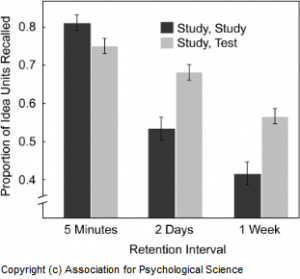Anxious? Yes… Yes I am. Why? Because it is finals week and finals make me anxious. However, if I am smart (which I like to think I am occasionally) then I may be able to use this anxiety to my advantage. When we encode information it means that we are taking what we want to remember and transferring it into our long-term memory. This can be done a number of ways. When we want to retrieve something from our long-term memory it is called retrieval. Sometimes we want to retrieve something from out LTM but just cannot seem to do that at the appropriate time. Like myself when taking an exam. I freeze up, my mind goes blank and I panic!! Total anxiety attack! So how can my anxiety help me retrieve the information I have encoded for my exam? Hopefully by applying State-Dependent Learning.
State-Dependent Learning is associated with ones state of awareness and internal feelings. In other words, we are likely to recall an event or something we studied if our internal feelings are the same as when we encoded the information.
Eric Eich and Janet Metcalfe conducted a study where one group of participant listened to sad music and another group listened to happy music. Once they were in the desired state (happy or sad), they were told to study a list of words. Two days later they were asked to come back and recall the list that they studied. What Eich and Metcalf discovered was that those who had the same state of mind (happy or sad) while encoding the list, showed better memory when asked to recall the list from two days ago.
So the way that I see it is that if I am able to be anxious while I study for the exam then my memory should serve me better as I take the exam; because lets be honest, I will be very anxious taking the exam. In all honesty I think that it is the anticipation of clicking the submit button that gets to me the most! However, once the exams are over and my grade is what it is, I am able to move on relax.
It is rare that I am anxious while studying because usually I have help with my daily tasks to make time for studying, however this semester I have not been so lucky. Especially now. We have relocated and my husband is currently still working 150 miles away so he is gone during the week, we have five children under the age of eight and it seems that no matter which day it is I am always three days behind. I have no time and no energy and yet an eminence desire to do well in school. If I am able to keep these internal feelings while I study and also when I take my exam, there may be a chance that my memory will serve me better simply because my state of mind dose not change.


